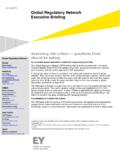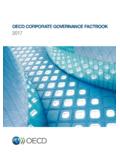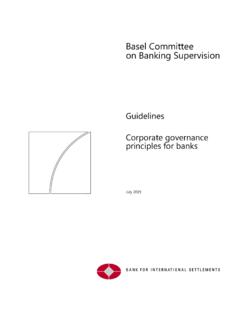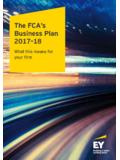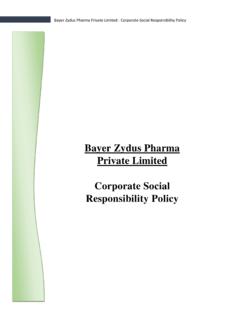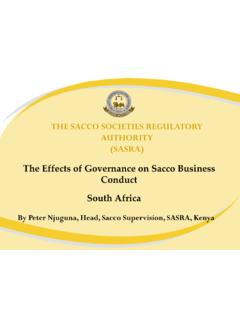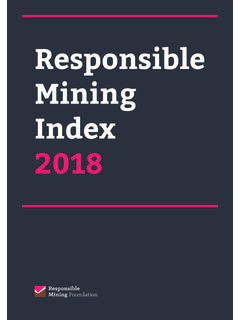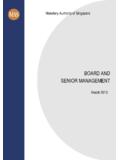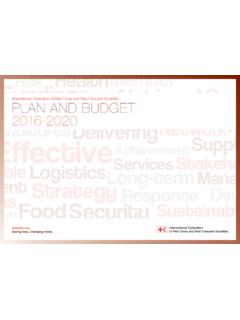Transcription of WASTE IN ASIA - Home – Sustainalytics
1 ISSUES FOR RESPONSIBLE INVESTORSMAR 2011 WASTE IN ASIAA uthor Jill ChinEditorLucy CarmodySarah Le BretonResponsible Research is an independent provider of sectoral and thematic Asian environment, social and governance (ESG) research, targeted at global institutional investors. Many of these fund managers and asset owners now find that traditional investment banking reports, financial models and public information sources can no longer be relied on to cover all risks to earnings and deliver superior returns. Companies who do not monitor and report on this non-financial performance not only risk financial penalties for non-compliance with stricter regulatory environments but are also denied access to substantial pools of global capital which are managed according to sustainable principles. Our approach is based on analysis of material ESG factors, which change according to sector and market. We provide our clients with local market knowledge of important regulatory landscapes in asia , along with a fresh perspective on local operational and sectoral issues.
2 We offer an annual subscription model for our monthly sectoral or thematic reports and give our clients access to the underlying data. Reports can also be commissioned (by investors or foundations) and kept for internal use or be offered for general distribution, as part of a general effort to promote ESG integration into the Asian investment process. Our analysts conduct seminars and webinars to discuss findings, often with contributions from experts, companies and Research was founded in 2008 by our Board members who have been instrumental in promoting Corporate Social Responsibility (CSR) and SRI practices in asia for over 10 years and have significant experience in the regions emerging investment markets. This team of five works in collaboration with our full time Asian-based responsible investment analysts and the Responsible Research Alliance, a group of consultants with subject matter expertise. Together they provide a valuable balance of market and ESG knowledge, academic rigour, process management, data management, customer relationship management and senior level contacts.
3 Many of our clients are signatories to the UN backed Principles of Responsible Investment (PRI), an investor initiative. As signatories they commit to incorporate ESG issues into their investment analysis and to support the development of ESG tools, metrics and methodologies. As a signatory to the PRI we voluntarily contribute time and resources to the Emerging Markets Disclosure Project and other collaborative initiatives. Responsible Research is also a strong supporter of independence in research, without which conflict and bias can deliver investment risk. The company is one of the founding members of the Asian Association of Independent Research Providers and also of the Asian Water more information, please contact Responsible Research: Email: +65 9386 6664 Research is the exclusive partner in asia for RepRisk , a web-based tool which provides insights on environmental and social issues that present financial and reputational risks to companies and investment portfolios.
4 The tool enables commercial and investment bankers, asset managers, and supply chain managers to manage the corresponding risks and to implement effective screening the RepRisk toolRepRisk is a web-based tool that allows you to identify and assess the environmental and social issues which may present financial, reputational and ethical risks. It is used by investment professionals, financial institutions, supply chain managers, multinational corporations and compliance managers, and includes a variety of features enabling clients to monitor risk trends over time, create customized watch lists, tailor alert services and more. The tool plays an integral role in increasing transparency and ensuring compliance with internal and international standards, thereby helping reduce risk comprehensive and relevant RepRisk database enables you to meet the risk management and compliance challenges in an increasingly complex world.
5 On a daily basis, RepRisk tracks a company s or project s environmental and social risk exposure by monitoring independent third-party sources such as all major print media, over 700 NGOs, newsletters, news sites, governmental agencies and blogs. Controversial issues covered include environmental footprint and climate change, human rights and community relations, labour conditions and employee relations as well as corruption and money-laundering. In particular, all principles of the UN Global Compact are addressed. RepRisk covers all major business languages (Chinese, English, French, German, Japanese, Korean, Portuguese, Russian, and Spanish) and its database currently includes over 15,400 companies and 3200 projects, and is updated and growing contact for more information. Responsible Research 2010 | Issues for Responsible Investors | 4 This report and its contents are the work of Responsible Research Pte reproduction or distribution is permitted without written SUMMARYThis report examines the environmental, social and governance (ESG) issues in the WASTE sector in asia .
6 Through a discussion of the current situation and trends in the Asian WASTE landscape supported by case studies of WASTE management companies in the region, the report highlights the ESG risks and opportunities that companies face on a strategic and operational level. As a key pillar of the environmental goods and services sector, responsible WASTE management drives sustainability, a prerequisite for continued economic progress in asia . Companies that incorporate ESG considerations in their business strategy and operations are better positioned to minimise secondary pollution from WASTE , generate social goodwill and gain stakeholder support for their services. Institutional investors can act in their fiduciary capacity on behalf of individual investors to exercise informed ownership through the monitoring and engagement of companies to improve their management of these critical issues.
7 The report begins with an introduction of the landscape for WASTE in asia and a brief overview of WASTE principles and policies. This is followed by a discussion of the ESG risks and opportunities in three main sections of environment, social aspects and governance . The report concludes with a company benchmarking of ten selected Asian WASTE companies using the Asian Sustainability RatingTM system (ASRTM). The ASRTM is a tool developed by Responsible Research that is used by investors to benchmark portfolios and add a sustainability dimension to investment decision-making and engagement practices. Four global WASTE companies are benchmarked as well to provide a comparative guide to the performance of the Asian paradigm shift in asia s WASTE sector is the increasing focus on WASTE as a source of renewable energy rather than a problem to be hidden. WASTE management has evolved from simple collect-and-dispose models to technology-driven treatment systems that convert WASTE into thermal power.
8 While landfill remains the dominant method of WASTE disposal, energy recovery systems that convert WASTE to energy and reduce the final amount of WASTE for landfill disposal are gaining in popularity throughout the region. Asian WASTE companies are active in developing energy recovery systems such as landfill gas capture, incineration plants and biogas extraction units. WASTE as a renewable energy creates new opportunities through climate change projects, where companies can seek financial assistance via the sale of carbon credits for WASTE projects that reduce greenhouse gas (GHG) emissions. Many companies have embarked on such projects, particularly in landfill gas capture, although success has been varied due to technical challenges associated with WASTE and suitability. However, firms that tap into WASTE -related energy opportunities need to ensure strict and transparent monitoring of emissions so that no air, water and land pollution results from the treatment process.
9 Hazardous WASTE management in asia requires urgent action to keep up with expanding industrial activity. Deficient environmental regulations and poor enforcement in developing asia result in the illegal dumping of WASTE by industrial generators, devastating the environment and reducing business opportunities for hazardous WASTE treatment companies. Global trade in hazardous WASTE also cripples environmental and human health in countries that receive a major share of the illegal WASTE trade for processing. Large-scale exports of electronic WASTE to China and India from developed countries have led to domestic and international efforts to curb the illegal trade and to channel the WASTE to regulated recycling companies. The seemingly inevitable rise in bulk hazardous WASTE is expected to create opportunities for hazardous WASTE treatment companies as regulations tighten and technological capacity 1: Key ESG Issues facing the WASTE sector in AsiaSource: Responsible ResearchEnvironmentalSocialGovernance Responsible Research 2010 | Issues for Responsible Investors | 6 This report and its contents are the work of Responsible Research Pte reproduction or distribution is permitted without written aspectsWaste management is a participative and community-driven process, characterised by a myriad of informal stakeholders including residents, community groups, rag pickers and NGOs.
10 Asian WASTE companies generally understand the importance of stakeholder engagement from project planning and development to implementation stages. The companies generally focus on engaging communities in upstream activities such as WASTE segregation and recycling. However, they have limited experience in community investment with defined social goals such as establishing long-term partnerships with local populations to improve income levels. Employee welfare is another high-priority area in which Asian WASTE companies seem to lag. There is limited information disclosed on health and safety standards, welfare benefits and training programmes. With increased social awareness and greater advocacy for labour rights, companies are likely to face increasing pressure from stakeholders to disclose more information and improve human resource governance in asia s WASTE sector is generally unimpressive, with key areas of concern being low board independence and limited disclosure on board committees, audit and nomination procedures, and risk management, among others.




